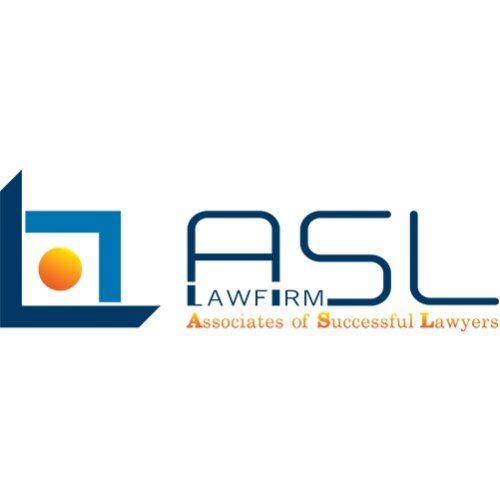Best Environmental Law & Compliance Lawyers in Vietnam
Share your needs with us, get contacted by law firms.
Free. Takes 2 min.
Or refine your search by selecting a city:
List of the best lawyers in Vietnam
About Environment Law in Vietnam
Environmental law in Vietnam encompasses various legal frameworks designed to protect the natural environment, promote sustainable development, and ensure that activities impacting the environment adhere to national and international standards. As a rapidly developing country, Vietnam faces challenges such as pollution, deforestation, and biodiversity loss, which necessitate focused legal measures. The legal system incorporates elements of civil law and statutory law, drawing from Vietnamese constitution, statutes, regulations, and international treaties to address environmental concerns.
Why You May Need a Lawyer
Individuals and organizations may require legal advice in environmental matters for several reasons. Common situations include:
- Facing regulatory challenges related to environmental compliance for business operations.
- Dealing with disputes over land use and natural resource management.
- Addressing allegations or charges of environmental violations.
- Participating in environmental impact assessments (EIAs) for new projects.
- Seeking compensation for harm caused by environmental pollution or disasters.
Local Laws Overview
Vietnam's legal framework for environmental protection is primarily governed by the Law on Environmental Protection (LEP), which outlines the responsibilities of state agencies, organizations, and individuals in safeguarding the environment. Key aspects include:
- Regulations on pollution control, waste management, and emissions standards.
- Requirements for conducting EIAs before starting projects likely to affect the environment.
- Legal provisions for biodiversity conservation and sustainable natural resource use.
- Policies for responding to climate change and managing ecological risks.
- Processes for public consultation and participation in environmental decision-making.
Frequently Asked Questions
What are the main regulations controlling pollution in Vietnam?
The Law on Environmental Protection, along with specific decrees and circulars, sets out standards for air, water, and soil quality. It also provides guidelines for waste management and the reduction of industrial pollution.
Do I need to conduct an Environmental Impact Assessment (EIA) for my project?
Yes, if your project is listed in the categories that have significant potential environmental impact, an EIA is required. This process assesses potential impacts and proposes measures to mitigate negative effects.
Who is responsible for enforcing environmental laws in Vietnam?
The Ministry of Natural Resources and Environment (MONRE) is the primary body, along with provincial and local environmental departments, responsible for implementing and enforcing environmental laws and regulations.
What penalties exist for violating environmental laws?
Penalties range from monetary fines to suspension of business operations. Serious violations may lead to criminal charges, including imprisonment.
Can individuals or organizations participate in environmental decision-making?
Yes, Vietnam’s laws provide mechanisms for public consultation and participation, particularly during the EIA process and in environmental planning and policy-making.
How are natural resources protected under Vietnamese law?
Natural resource protection falls under various regulations focused on sustainable management and conservation of forests, water bodies, fisheries, and other ecological assets.
What is Vietnam's approach to climate change within its legal framework?
Vietnam has enacted policies aimed at mitigating and adapting to climate change impacts, establishing targets for reducing greenhouse gas emissions and enhancing resilience against climate impacts.
How do Vietnamese laws address waste management?
Waste management is a critical component of the LEP and involves regulations for collection, treatment, recycling, and disposal of waste, with specific provisions for hazardous waste.
What rights do communities have to claim compensation for environmental damages?
Communities affected by environmental damage may seek compensation through legal claims if they can prove harm and link it to activities violating environmental laws.
Are there international treaties that Vietnam adheres to for environmental protection?
Yes, Vietnam is a signatory to various international treaties such as the Paris Agreement, the Convention on Biological Diversity, and others relevant to marine and atmospheric protection.
Additional Resources
The following resources can provide further assistance in understanding environmental laws in Vietnam:
- Ministry of Natural Resources and Environment (MONRE): The central body for managing and enforcing environmental regulations.
- Vietnam Environment Administration (VEA): Responsible for preventing pollution, managing waste, and protecting biodiversity.
- Non-governmental organizations (NGOs): Organizations like WWF Vietnam and Green ID work on environmental advocacy and could help with specific environmental issues.
- Legal journals and publications: Publications focusing on Vietnamese environmental law can provide insights into specific legal issues.
Next Steps
If you need legal assistance in environmental matters, consider taking the following steps:
- Identify Your Needs: Clearly define your legal needs and gather all relevant documentation.
- Consult a Lawyer: Seek a legal professional specializing in environmental law to guide you through local regulations.
- Visit the MONRE website: Regular updates, relevant laws, and announcements can provide valuable context.
- Join forums or groups: Online or local groups discuss environmental issues, offering support and sharing experiences.
- Stay Informed: Keep abreast of changes and developments in both local and international environmental law.
Lawzana helps you find the best lawyers and law firms in Vietnam through a curated and pre-screened list of qualified legal professionals. Our platform offers rankings and detailed profiles of attorneys and law firms, allowing you to compare based on practice areas, including Environmental Law & Compliance, experience, and client feedback.
Each profile includes a description of the firm's areas of practice, client reviews, team members and partners, year of establishment, spoken languages, office locations, contact information, social media presence, and any published articles or resources. Most firms on our platform speak English and are experienced in both local and international legal matters.
Get a quote from top-rated law firms in Vietnam — quickly, securely, and without unnecessary hassle.
Disclaimer:
The information provided on this page is for general informational purposes only and does not constitute legal advice. While we strive to ensure the accuracy and relevance of the content, legal information may change over time, and interpretations of the law can vary. You should always consult with a qualified legal professional for advice specific to your situation.
We disclaim all liability for actions taken or not taken based on the content of this page. If you believe any information is incorrect or outdated, please contact us, and we will review and update it where appropriate.
Browse environmental law & compliance law firms by city in Vietnam
Refine your search by selecting a city.
















